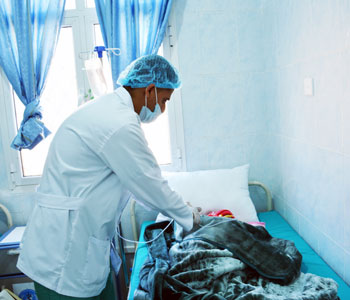 11 May 2017, Sana’a, Yemen — The World Health Organization (WHO) and partners are responding to an upsurge in cholera transmission in several parts of Yemen that has claimed 51 lives and caused around 2752 suspected cases since 27 April 2017.
11 May 2017, Sana’a, Yemen — The World Health Organization (WHO) and partners are responding to an upsurge in cholera transmission in several parts of Yemen that has claimed 51 lives and caused around 2752 suspected cases since 27 April 2017.
WHO has rapidly distributed medicines and medical supplies, including cholera kits, oral rehydration solutions and intravenous (IV) fluids as well as medical furniture and equipment for diarrhoea treatment centres. Ten new treatment centres are being established in affected areas.
WHO is also supporting health authorities to establish oral rehydration therapy corners to treat mild and moderate dehydration due to diarrhoea. Starting with 10 oral rehydration therapy corners in Sana’a, this approach will be replicated across all affected areas. More severe cases will be referred to the diarrhea treatment centres.
“We are very concerned with the re-emergence of cholera across several areas of Yemen in the past couple of weeks. Efforts must be scaled-up now to contain the outbreak and avoid a dramatic increase in cases of diarrhoeal disease,” said Dr Nevio Zagaria, WHO Representative in Yemen.
Cholera is an acute diarrhoeal infection caused by ingestion of food or water contaminated with the bacterium Vibrio cholera. Most of those infected will have no or mild symptoms but, in severe cases, the disease can kill within hours if left untreated.
The uptick in cholera cases comes as Yemen’s already weakened health system struggles under the weight of two years of conflict. Key infrastructure, including water and sanitation facilities, are collapsing, contributing to the spread of diarrhoeal disease. The weather is also playing a role: the pathogens that cause cholera are more likely to spread in warmer weather and recent heavy rains have washed piles of uncollected waste into water sources.
The cholera outbreak in Yemen was announced by Yemen’s Ministry of Public Health and Population (MoPHP) on 6 October 2016. WHO estimates that 7.6 million people live in areas at high risk of cholera transmission.
Prior to this recent resurgence, WHO had supported the rehabilitation of 26 diarrhoea treatment centers in the affected governorates and trained health workers to treat patients based on WHO case management, infection prevention and control standards. The Organization has also trained and supported the deployment of rapid response teams to investigate potential cases and chlorinate water sources in areas where cholera has been reported.
WHO continues to support the efforts of health authorities in enhancing diagnosis capacity, strengthening the disease surveillance system, delivering medicines to high-risk areas, organizing health education campaigns for at-risk populations and training national staff on case management and early detection and reporting.
“WHO is in full emergency mode to contain the recent upsurge of suspected cholera cases,” continued Dr Zagaria. “Containing the spread of the outbreak is a high priority for WHO and we are coordinating efforts with all parties and with our health, water and sanitation partners to scale up an integrated and effective response to the cholera epidemic.”








